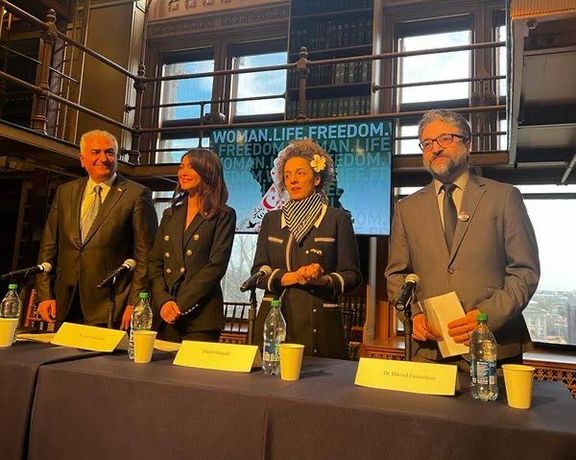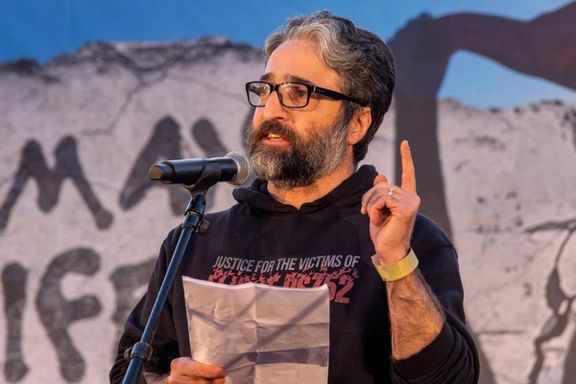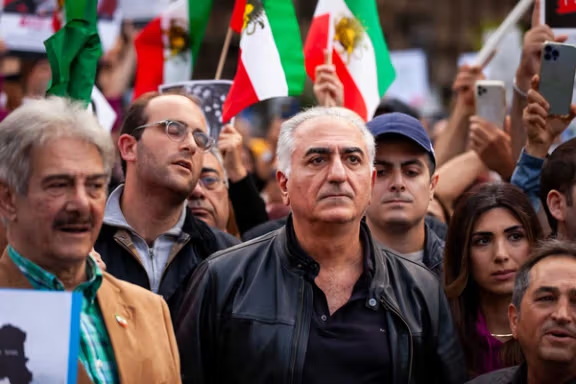Four Prominent Iranian Opposition Figures Renew Unity Pledge

After the resignation of Iranian activist Hemed Esmaeilion from an opposition alliance, four remaining members vowed Wednesday to stay in the group and continue their mission.

After the resignation of Iranian activist Hemed Esmaeilion from an opposition alliance, four remaining members vowed Wednesday to stay in the group and continue their mission.
“Although maintaining solidarity has become difficult, we will still carry on as we stand united,” they said in a statement.
The four members are Nobel Peace Prize laurate Shirin Ebadi, prominent activist and women’s rights defender Masih Alinejad, activist and actress Nazanion Boniadi and a Kurdish-Iranian politician Abdollah Mohtadi.
The fifth member of the group, Prince Reza Pahlavi, who is currently visiting Italy to advocate for the Iranian freedom movement, has not yet expressed his position.
Esmaeilion announced last week that he was leaving the Alliance for Democracy and Freedom in Iran because of what he described as lack of democracy and transparency in the council and the “domination” of one member over the others.
In an interview with Iran International TV April 22, Esmaeilion who had not directly mentioned the exiled Prince as the reason for leaving the alliance a day earlier, named him as the person with whom he had disagreements and left the group.

The alliance announced its existence in a February event at Georgetown University and issued its charter, the Mahsa Charter, in early March and its members said they had agreed on “minimal positions” that could create the most consensus among the opposition.
Since last week, thousands of Iranians have been hotly debating the fate of the Alliance, which was formed earlier this year as a vehicle to support the freedom movement after months of popular anti-regime protests in Iran.
The four members of the Alliance also said in their statement that “We do not have a goal except to help the movement inside Iran…and to be the outreach for the voice of the freedom movement of the people to the world.”

Prince Reza Pahlavi said in an April 4 tweet that he had submitted a letter containing the names of additional prospective members to give a voice to those who were unrepresented in the alliance. In another tweet on April 10 he reported that members of the group had not come to a consensus regarding the said candidates.
Calling this a setback, the Prince had also said that he would work with other individuals and groups “to amplify the voices of all Iranians, adding that he would not limit himself “to one group” and stand behind “all groups who believe in ensuring Iran's territorial integrity, who want human rights for the Iranian people, and who believe the future government of Iran should be a secular democracy, the form of which should be decided by the Iranian people.”
If Prince Reza Pahlavi, who has not announced his withdrawal from the opposition group, actively rejoins the Alliance council, the group can still maintain strong influence and be an effective advocate of the movement.
Some of his supporters, who call themselves “constitutional monarchists,” believe that Prince Pahlavi enjoys a large measure of popularity in Iran and alone he can be an effective voice for the revolutionary movement. However, others still believe that a united front of prominent activists is the best vehicle to foster coordination and more legitimacy for the opposition.
The Iranian regime, badly shaken by the most dangerous challenge to its rule in 44 years since the 1979 revolution, is watching these developments. Government-controlled media in Tehran have been expressing satisfaction at the apparent division among the prominent activists, hoping that their advocacy in Europe and North America would become weaker.